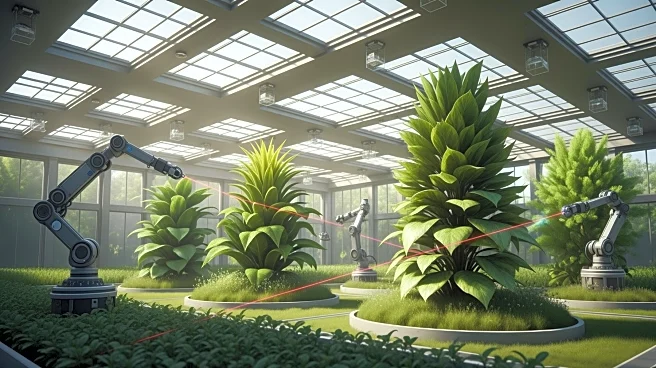What's Happening?
Carbon Robotics has developed a large plant model (LPM) for its laser-weeding robots, which are operational in 14 countries. The company, led by CEO Paul Mikesell, aims to address agricultural challenges by using AI and robotics to improve the weeding process.
Mikesell founded the company after recognizing the inefficiencies in traditional agricultural methods during a conversation with a farmer. The LPM allows the robots to identify and target weeds effectively, using a curated dataset collected by the company. Carbon Robotics has focused on creating high-quality data by perfecting the lighting system around its cameras, ensuring clear images in varied outdoor conditions. This data collection has enabled the company to build robust AI models that can generalize plant types without prior knowledge, facilitating quick deployment in new crop environments.
Why It's Important?
The development of Carbon Robotics' LPM is significant for the agricultural industry, as it offers a more efficient and cost-effective solution to weed management. Traditional weeding methods are often labor-intensive and costly, whereas the laser-weeding robots can operate autonomously, reducing the need for manual labor and increasing productivity. This innovation could lead to higher yields and lower operational costs for farmers, potentially transforming agricultural practices. The ability to quickly adapt to different crops without retraining the AI model further enhances the robots' utility, making them a versatile tool for farmers worldwide. As the demand for sustainable and efficient farming solutions grows, Carbon Robotics' technology could play a crucial role in meeting these needs.
What's Next?
Carbon Robotics plans to continue expanding its technology and product offerings. The company recently raised $20 million in a Series D-2 extension round, which will support the development of a new product line utilizing its existing AI stack. This new line is expected to introduce innovative robots that further enhance agricultural operations. Additionally, the company is exploring the potential use of generative AI for synthetic training data and human interaction, which could improve the efficiency and user-friendliness of its systems. As Carbon Robotics continues to innovate, it may influence broader adoption of AI and robotics in agriculture, driving industry-wide changes.
Beyond the Headlines
The ethical implications of using AI and robotics in agriculture include concerns about job displacement and the need for farmers to adapt to new technologies. However, the potential benefits, such as increased efficiency and reduced environmental impact, may outweigh these concerns. The use of AI in agriculture also raises questions about data privacy and security, as large datasets are collected and analyzed. As the industry evolves, stakeholders will need to address these issues to ensure responsible and sustainable integration of technology.
















